"The observer who glances over a rich and fertile plain, watered by rivers and streams which have, during a long series of ages, pursued the same uniform and tranquil course; the traveller who contemplates the walls and monuments of a great city, the first founding of which is lost in the night of ages, testifying, apparently, to the unchangeableness of things and places; the naturalist who examines a mountain or other locality, and finds the hills and valleys and other accidents of the soil in the very spot and condition in which they are described by history and tradition - none of these observers would at first suspect that any serious change had ever occurred to disturb the surface of the globe. Nevertheless, the earth has not always presented the calm aspect of stability which it now exhibits; it has had its convulsions, and its physical revolutions, whose story we are about to trace."



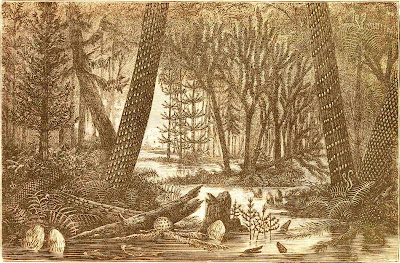
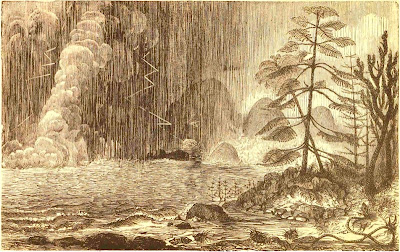














"The object of "The World before the Deluge" is to trace the progressive steps by which the earth has reached its present state, from that condition of chaos when it "was without form and void, and darkness was upon the face of the the deep," and to describe the various convulsions and transformations through which it has successively passed."
'The World Before the Deluge' by Louis Figuier (1872 revision of the 1862 text) is online at 19th century science.
****UPDATE: A full (and better quality) 1863 edition of this book has now been uploaded by Strasbourg Digital Library.
- The Library of Congress have a blog.
- Brian Sawyer (Craftzine, Makezine) has a blog - bookbinding and craft.
- The only thing I've seen at the British Library's 'Sacred' online gallery is an exquisite Ethiopian bible in the Turn the Pages section (I haven't quite worked out yet what exactly is 'new' here).
- 'Discover Islamic Art in the Mediterranean' contains >600 artefacts from 14 countries in 18 exhibition sites, assembled by 90 curators from the productive output of 1200 years. (multiple languages) For each exhibition site, click the 'more information' and any other links around to find everything available. (first appearances are a little deceptive).
- Revolutionary Players is another vast site I've hardly looked at "focusing on the history of the Industrial Revolution in the West Midlands in Britain between the years 1700 and 1830." [via]









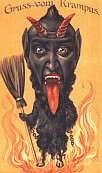
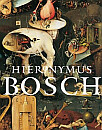
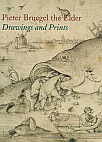

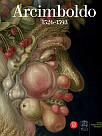

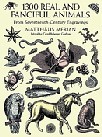
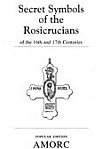


11 comments :
There is something strangely appealing to me about these landscapes... possibly the notion that they're "ideal" even if the animals shown are attacking one another. The mammoth skeleton in the St. Petersburg museum can hardly be called an ideal scene, though, can it??
I like that earthy wash and grainy tinge to the printing - these are not 'pretty' illustrations. If you click on the images, I actually scaled down the enlargements a little bit to reduce the - what I call - sheen of age from shabby or cheap printing. It's like looking through a muddy lens, which kind of struck some ironic chord for me when I first saw them. Looking back in time to a another time's look back in time.
Well, 'ideal' isn't used with the caption for the mammoth skeletons. This (for me) was an ultra-lazy post. I haven't even been through the whole of the >200 illustrations in this book. There's a link somewhere after getting into the site proper that takes you to all of them in high-res. I just nabbed this bunch from the samples they have on that first page. There's very little about the author online other than he was a (prolific) 'popular science' writer from France. So any alleged 'ideal' here is likely sifted and repackaged from other sources anyway.
I ended up going to the source and downloading a batch of the high-res versions. Which struck me as a little odd because certainly much of what you put up is more beautiful or bizarre.
I think it was the fact that while I tend to think present-day collage artists who use xylographic source material are wimpy imitators of Max Ernst, all the same xylographic prints offer possibilities that just can't be obtained from more modern materials. (Miroslav Huptych manages this in his best collages, http://huptych.cz, though to see selections from his brilliant newish book, go to http://www.huptych.cz/vlci_mliko.pdf)
So... there was something very tempting about landscapes that have trilobites and other extinct fauna roaming about and one of these days I might do something perverse like add photos of Milča Mayerová doing her alphabet dance to a scene of primeval forests or ammonites.
I should add that the color variations on these are decidedly part of their special charm. They kind of shimmer, though perhaps only onscreen.
Thanks, that Huptych site is very cool.
That 'shimmer' is what I called 'aged sheen' - I think it's a combo of the printing quality/glossy paper perhaps and the scanning/light source. So yeah, it would be interesting to see the actual book alongside the digital file.
By the way, 'Before the deluge' was something of a significant work - it is the scientific source for Jules Verne's 'Journey to the Centre of the Earth'. [LINK]
Not everyone held our Monsieur Figuier's writings in high regard however:
"Antiquated views, utter lack of comprehension of the subjects treated, and shameless unscrupulousness as to accuracy of statement, are faults but ill atoned for by sensational pictures of the "dragons of the prime that tare each other in their slime," or of the Newton-like brow and silken curls of that primitive man in contrast with whom the said dragons have been likened to "mellow music." " (this is not referring to the 'Deluge' book but for this critic I doubt it much mattered.
Heh. [LINK]
Dang, that's one of the best scathing reviews I've ever seen! --"these pretentious books belong to the class of pests and unmitigated nuisances in literature". I can hardly wait to see more titles by Figuier, with their souls, polyps, and batrachians. (What the devil is a batrachian?)
batrachian
A froggist. One given to frogophilic tendencies - hopping mad about some subject or other.
PK, you've done it again-- you've opened the door to yet another fascinating world of images and ideas. Every time I come here, I want to stop everything and spend a week lingering over your latest book. (That cool "Middle Oolite Period" deserves a month by itself.) But I'll just have to add this one to my backlog of 142 other tantalizing but unexplored works. I don't know how you are able to spend so much time exploring these lovely works, but I am grateful (and jealous).
Batrachian merely froggish? Fond of frogs though I am, I was expecting some sort of gigantic beast, admittedly reptilian or amphibian, but possibly with wings or else living so far underwater that it warms its webby toes on the lava from undersea volcanic vents. Actually, almost something you might expect to find in H.P. Lovecraft, but less revolting.
Looking at these pictures, brought to my mind's ear, Stravinski's "Rites of Spring."
tmk
Post a Comment
Comments are all moderated so don't waste your time spamming: they will never show up.
If you include ANY links that aren't pertinent to the blog post or discussion they will be deleted and a rash will break out in your underwear.
Also: please play the ball and not the person.
Note: only a member of this blog may post a comment.